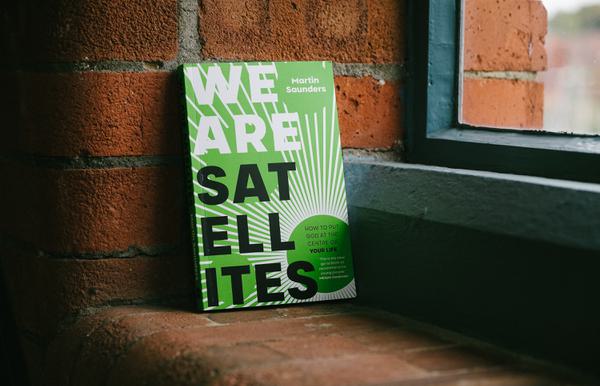Young people understand that if you really love something or someone, you'll point everything in your life towards it. Do they see Christian 'worship' in the same way?
Over the next seven weeks, we're going to be diving deep into the core values behind Satellites– from a youth leader perspective. If you want to explore them with young people, check out our offer on the book written for them; get seven copies and a 'book group' study guide for the price of six.
If there's one thing that online versions of church can't quite translate, it's the experience of corporate worship. Being together with a group of 10, or a crowd of 10,000; belting out a classic John Wesley hymn or the latest Hillsong anthem. Sung worship is undeniably good for the soul – and right now a lot of us badly miss it. As much as we try to recreate the same experience, it's just not the same when your family's off-key attempt to sing along to What a Beautiful Name is interrupted by your next-door neighbour banging on the wall.
To assuage our feelings of loss in this matter, some have been keen to point out that this isn't really what worship is about anyway. And to an extent that's true... but it's not the whole truth. Worship is not just about singing together, but singing together most definitely is worship. And since worship is the very thing that we were made for, it's hardly surprising that right now we feel the loss of not being able to worship in the way to which we've become accustomed.
In the Old Testament, in the somewhat-stodgy book of 1 Chronicles, the author (probably Ezra) dedicates a huge amount of space to recording the key names in David's court. The mighty fighting men obviously get a mention, as do the priests, but alongside them – given a whole 31-verse chapter – he lists the musicians. And earlier on in the book, David creates a musical song and dance party in response to God's presence to which he commits so strongly, it makes his wife cringe. David – Israel's greatest king and perhaps the one who walked most closely with God – lived a life of worship, and music was a huge part of it.
"It's not weird to suggest you'd give everything to a cause if you truly believed in it; in many ways it's stranger to draw the line at singing a few appreciative songs."
But... worship isn't only about singing. If it's about putting God in his proper place, as the most 'worthy' person or thing in our lives, then as any relationship specialist will tell you, that has to involve more than just words. Worship music helps us to tell God that he's worthy – that he's at the centre of our lives – but we also need to demonstrate that he's worthy.
In Romans 6 v 13, Paul tells the church: "offer yourselves to God as those who have been brought from death to life; and offer every part of yourself to him as an instrument of righteousness." In a nutshell, that's what it means to demonstrate God's prime place in your priorities: to offer every part of yourself to him.
This is a much better, much broader definition of worship – and contrary to our instincts, it's not one which scares young people away. Because if God really is God – creator of all things, interested in every part of us and the gateway to eternity – then of course he demands every part of us. It's not weird to suggest you'd give everything to a cause if you truly believed in it; in many ways it's stranger to draw the line at singing a few appreciative songs.
Young people want to worship
Young people get the idea of putting something at the centre of their lives (you may have seen that this was the starting point of our recent Satellites vision video – you can watch it below). They understand that if you are fanatical about something or someone you love, or fixated on an ultimate prize or goal, you'll point everything in your life towards it. I know that sometimes in my youth ministry, I've been fearful of asking too much of teenagers; of demanding they give too much of their time to their faith. Yet these same young people think nothing of watching every football match available (and right now, that's some feat), studying relentlessly toward their university or business dream, or devoting their every spare moment to their latest crush. This is the generation that spends hours each day watching their favourite YouTubers. Young people want to worship.
So, as youth leaders, let's introduce them to something worth worshipping – and then offer a framework for what that looks like in practice. First, and this is a deeply unfashionable idea these days, it's helpful to share the concept of 'times of devotion.' That doesn't necessarily need to be a 'quiet time' before the day starts, but it really means setting aside a bit of time, regularly and perhaps even every day, to put God in his rightful place in our lives. Taking a bit of time to pray, and to listen to God in quiet and through his word, is a discipline which demonstrates that we put God first. We should invite young people to follow our own example in this: a daily act of worship.
Second though, we can invite young people to choose to worship God through the way they live their lives – not just while they're on church property, but also at school, on the sports field, at the dinner table and in the middle of a game of Among Us. Each of those situations offer myriad opportunities to either honour God, or take a little step away from him; to include him in our thinking and our behaviour, or leave him out. The very way in which we live our lives can either be worshipful, or demonstrate that God isn't quite our top priority after all.
Most importantly, we worship God because he is worth worshipping. He made the world. He gave us life. He offers us eternity; he is worthy of our praise. But as we worship – through small ways and in grand acts – that worship in turn transforms us, because it involves us in the presence and the purposes of God. If we're truly going to ask young people to put God first, then it makes sense that worship becomes an important value in their lives. That's why singing praise – hopefully one day soon in an arena full of young people – feels so right, but it's important that we remember that worship is just as much about what we do when we leave the arena too.











